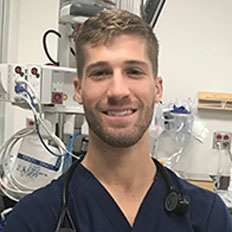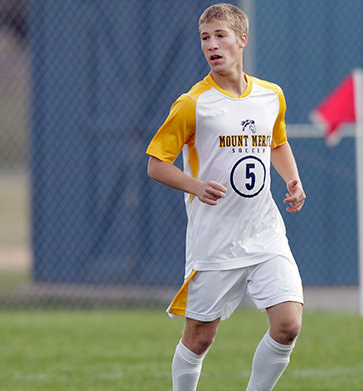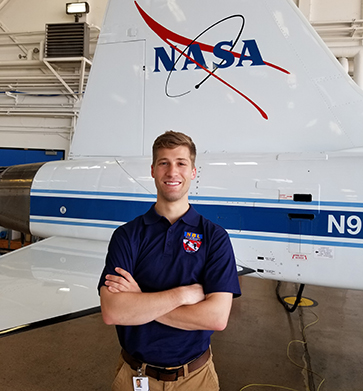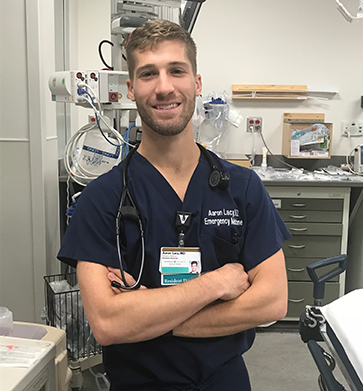
Aaron Lacy '14
Biology & Pre-Medicine
More Than Mountains
Aaron Lacy ’14 says it’s seeking experiences beyond his comfort zone that has shaped the kind of person he’s become.
Some of these experiences include being a student-athlete, conducting research at NASA, and providing medical services in the Himalayas.
Performance as a Mustang
When Lacy started at MMU as a student-athlete in soccer and track, he didn’t have a plan for his future. But through his experiences both inside and outside the classroom, as well as through the guidance of his professors, coaches, and classmates, his life found direction and a path to medical school at the University of Iowa.
It’s humbling to realize how much I relied on my mentors early on. They helped me grow and pushed me to my limits. I graduated an entirely different person than when I started.
 “Aaron is self-motivated and has the ability to lead and work as a team player,” said Alesia Hruska, professor of biology. “As an academically talented, dependable, and compassionate person, I have every confidence that he will be a great doctor with a caring bedside manner.”
“Aaron is self-motivated and has the ability to lead and work as a team player,” said Alesia Hruska, professor of biology. “As an academically talented, dependable, and compassionate person, I have every confidence that he will be a great doctor with a caring bedside manner.”
“It’s humbling to realize how much I relied on my mentors early on," said Lacy. "They helped me grow and pushed me to my limits. I graduated an entirely different person than when I started.”
Research at the NASA Johnson Space Center
As a medical student, Lacy became enthralled with the field of space medicine and the concept of human physiology in weightlessness.
“I realized that as technology steadily advances, the limits of the human body may be what prohibit deep space travel unless we devote more time and research to studying how humans operate in space,” he says.
In spring 2018, NASA selected Lacy for an aerospace medicine rotation where he could learn from the field’s leading experts at the NASA Johnson Space Center in Houston, Texas. He was paired with lead physician Dr. Robert Sanders of the Neutral Buoyancy Laboratory, which is used to train astronauts for spacewalks and also houses an altitude and hyperbaric chamber.
 “It was an incredible opportunity to have an inside view into how the human race is pushing its limits as a species,” Lacy says of the research that is examining ways to increase the time of useful consciousness for astronauts and aviators when exposed to a low-oxygen environment.
“It was an incredible opportunity to have an inside view into how the human race is pushing its limits as a species,” Lacy says of the research that is examining ways to increase the time of useful consciousness for astronauts and aviators when exposed to a low-oxygen environment.
Service in the Himalayas
Intrigued with global health, Lacy left his familiar environment to serve the people of the Zanskar Valley in Ladakh, India, the most isolated part of the Himalayas. Without hesitation, Lacy says the month-long rotation was as unique a clinical experience as one can find in medical school.
“I have worked in many emergency departments during my training, all of which have presented their own unique challenges and difficult environments, but no environment was as challenging as this,” said Lacy.
The clinical sites they served were only accessible by foot. The team had to hike over an 18,300-foot pass, camp at altitudes of 14,000 feet, and carry all of their clinic and personal supplies as they traveled between villages. The clinic days varied greatly, treating farmers one day, monks the next, and schoolchildren after that.
“My biggest takeaway from the trip is the culture of Western medicine and how we feel we must fix everything," said Lacy. "But sometimes trying to fix things can do more harm than good, both here and abroad, so we should tread carefully in our daily practices.”
But sometimes trying to fix things can do more harm than good, both here and abroad, so we should tread carefully in our daily practices.
Practice in medicine
University of Iowa colleague Dr. Jacob Melendrez says Lacy is a skilled clinician, known for “treating everyone with respect, kindness, and caring—a tireless advocate for his patients and colleagues.” For the kind of physician Lacy represents, the University of Iowa honored him with its Leonard Tow Humanism in Medicine Award.
“When it came to patient care, I did not work with another provider, regardless of level of training, who cared more for his patients,” says Melendrez, who nominated Lacy for the award. “Aaron is compassionate and committed, hardworking and honest, and, if a family member of mine were sick, I would want them treated by someone whose clinical knowledge is surpassed only by their willingness to truly care for their patients—someone like Dr. Lacy.”
 University of Iowa colleague Dr. Ethan Craig, who also nominated Lacy for the award, agrees. “Aaron’s patience, intelligence, and empathy make him perfectly suited to be on the front lines of health care,” says Craig.
University of Iowa colleague Dr. Ethan Craig, who also nominated Lacy for the award, agrees. “Aaron’s patience, intelligence, and empathy make him perfectly suited to be on the front lines of health care,” says Craig.
A combination of Lacy’s willingness to lend a helping hand and accept new challenges shape a career path that benefits others along the way.
“Applying for rotations at the Johnson Space Center, seeing more patients than I feel comfortable with on shifts, and exploring new areas of the world are all things I had and have reservations about, but I put myself out there," said Lacy. "In the end I never regret it and grow from the experiences.”
In the end I never regret it and grow from the experiences.
Inspired by MMU classmates
The people Lacy got to know and work with at MMU were key players in shaping his life and still are to this day. He says professors Ryan Bezy, Alesia Hruska, Joseph Nguyen, Kristopher Keuseman, Neil Bernstein, Anna Waterman, and Dennis Dew, at any given time, were involved in a turning point in his life and career.
At MMU, Lacy grew in expected ways. He learned how to effectively manage his time and grow in leadership and teamwork roles. But what he didn’t expect was how much he would grow emotionally and culturally.
"This has helped me in my medical career, too, seeing more similarities than differences in my patients.”
“Over my four years, I had the privilege to befriend and work with dozens of individuals from countries all around the globe—a wonderful opportunity to gain perspective on the human experience for someone who had lived in Iowa their entire life," said Lacy. "This has helped me in my medical career, too, seeing more similarities than differences in my patients.”
Lacy says he would be amiss if he didn’t mention how inspired he is to this day by his classmates “who have gone on to bigger and better things than me” as aspiring physicians (Ben Reinhart ’12, Allison Roe ’14, James Estipona ’14, and Nicole Morrow ’15), dentists (Megan Vogel Timm ’14 and Meghan Nelson ’14), chiropractors (Kodey Salow), physical therapists (Brooklyn Schrader ’13 and Taylor Helms ’13), physician and surgical assistants (Brady Gerber ’14 and Erica Soppe Reed ’14), pharmacists (Kelsey Kernan ’14), and researchers (Matthew Purl ’14).
As Lacy mentioned in his speech at the annual Donor Appreciation Dinner in June, the average acceptance rate into medical school is 40 percent, and it is similar for other medical specialties.
“Nearly 100 percent of this cohort got into the graduate school program or career of their choice and are now actively practicing in that field, which is remarkable,” he says.